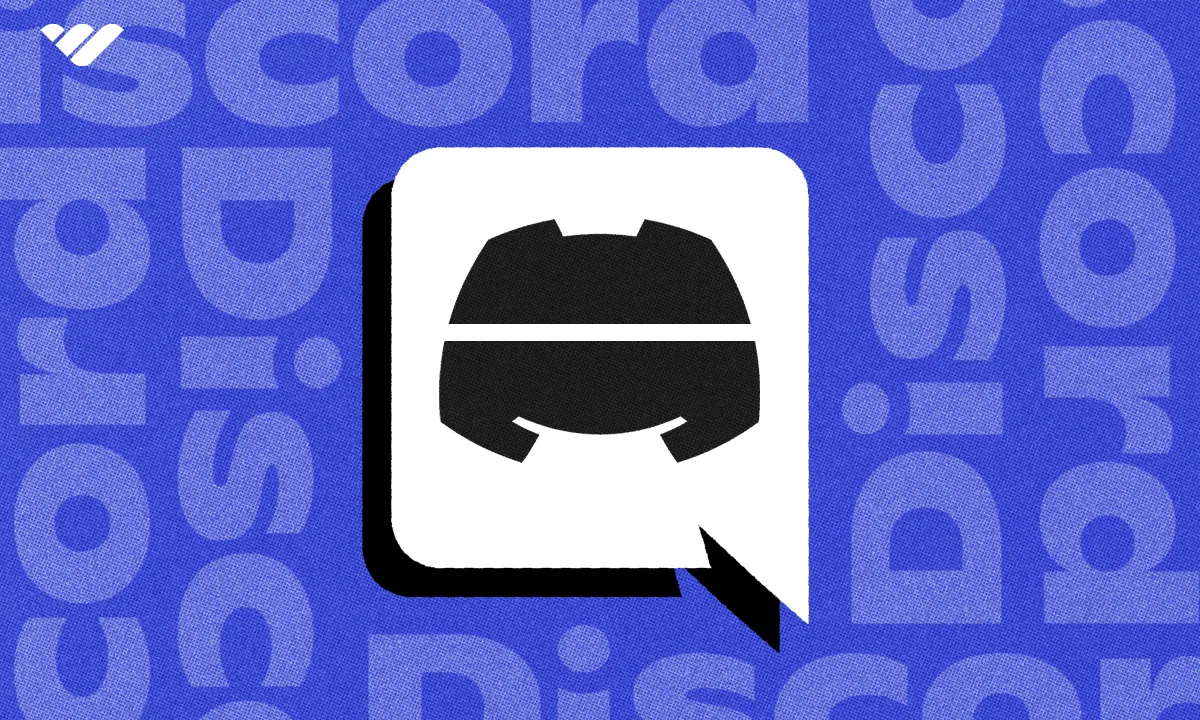Searching for Discord alternatives? Start with Whop — the leading platform for creators to grow and monetize their communities.
Key takeaways
- Choose your platform based on your primary goal: monetization, workplace collaboration, gaming, privacy, or audience reach.
- Whop solves Discord's biggest limitation by letting creators charge for community access and manage payments seamlessly.
- Privacy-focused alternatives like Signal and Element offer strong encryption and data control that Discord lacks.
If you’re trying to grow or monetize a community, Discord isn’t your best option — Whop is.
Discord is great for casual chat, but it wasn’t built for business. There’s no simple way to sell access, manage payments, or create a professional member experience. That’s where Whop comes in — an all-in-one platform where you can host, grow, and get paid for your community.
Still, Whop isn’t your only option. Depending on your goals, from private groups to professional networks, there are plenty of other tools that might fit better.
Here’s a breakdown of the 22 best Discord alternatives, including Whop, to help you find the perfect platform to chat, grow, and monetize your audience.
Our 22 best Discord alternatives
The best all-rounder
1. Whop
Whop is the ideal all-in-one platform for building and monetizing a community from scratch.
You can choose to host your community right on Whop or supercharge an existing community on another platform. With our integrated Discord app, you can use Whop to gate access to an existing Discord community by charging a one-time or subscription fee.
If you’re starting fresh, you can set up a branded community space with chat and forums in minutes. When you're ready to level up, you can add premium features like live events, giveaways, and member-only content.
If you love Discord but want to get paid, this is a game-changer.
- Best for: Creators and entrepreneurs who want to build and monetize a community from scratch or supercharge an existing one.
- Pros: Build a custom landing page, launch an affiliate program, offer free trials, accept multiple payment methods (including crypto), and start for free.
- Pricing: Whop is free to get started. You're only charged a small percentage when you make a sale.
Professional online spaces
These platforms can be a good choice if you're building a community of professionals or need a tool for team collaboration.
2. Slack
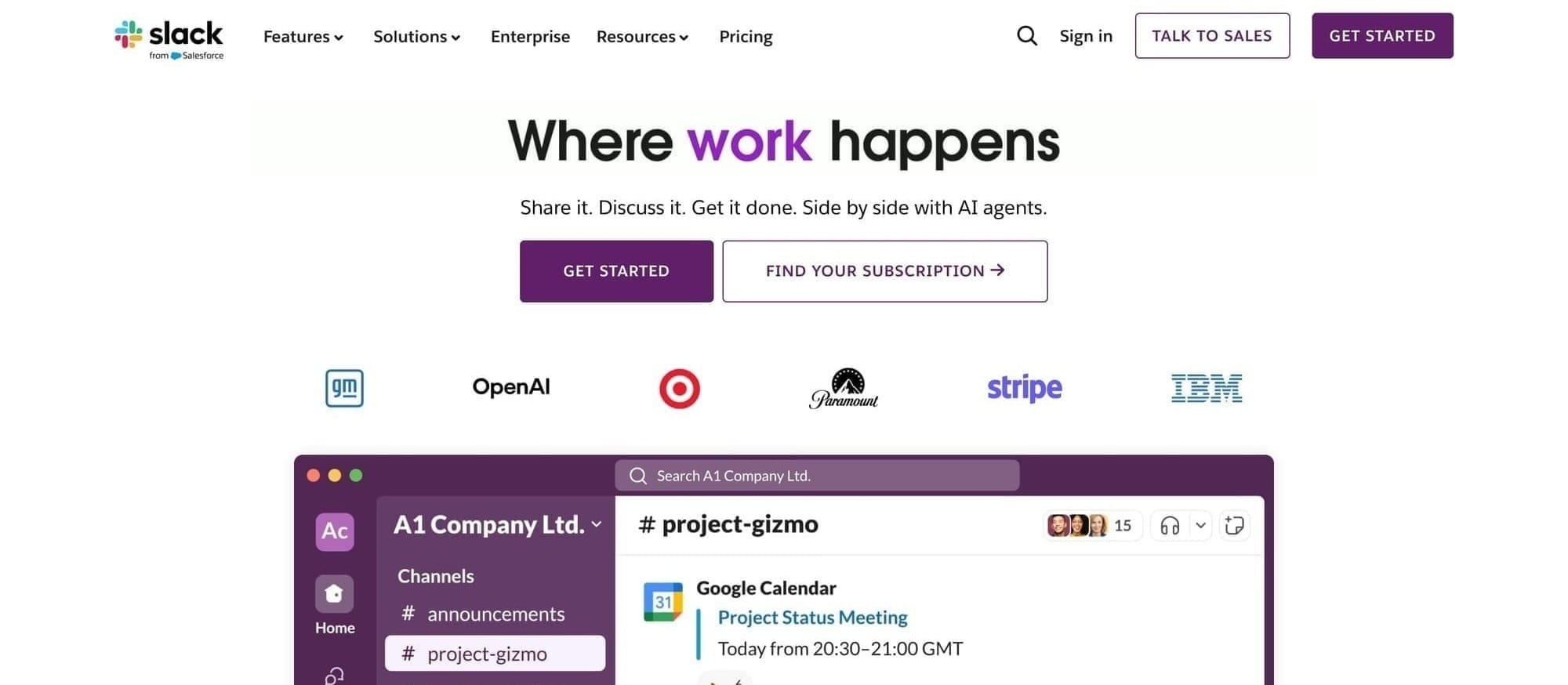
Slack and Discord have a lot in common: channel-based chat, video calls, and integrations. But Slack is designed for the workplace.
While Discord thrives on nicknames and fun avatars, Slack is all about a professional feel with real names and clear profiles. It also excels at organizing threaded conversations and integrates seamlessly with thousands of business apps.
- Pros: User-friendly interface, host live video calls, over 2,600 integrations, share 1GB files.
- Cons: Heavily limited free plan, expensive for large communities.
- Pricing: A free plan is available. Paid plans start at $8.75/person/month.
3. Microsoft Teams
Microsoft Teams is built to work perfectly with Office 365. Its focus on security, compliance, and real-time document collaboration makes it a powerhouse for businesses. The platform is a complete contrast to Discord’s casual vibe, making it a professional-only space that is great for sharing confidential documents and having high-quality video calls.
- Pros: Seamless Office 365 integration, excellent video conferencing, and enterprise-level security.
- Cons: Not attractive for casual users, only valid for those in the Microsoft ecosystem.
- Pricing: A free version exists. The Business Basic plan is around $5 per user per month.
4. Flock

Flock is an all-in-one productivity tool designed to reduce app clutter. It combines chat, video conferencing, and task management into one streamlined platform.
The interface is minimalist and professional, a pretty big departure from Discord's more playful feel. It’s perfect for small-to-medium teams that need a clean and efficient workspace.
- Pros: Clean and intuitive interface, integrated video calls and task management, real-time messaging.
- Cons: More limited customization than other options, lacks features for public communities.
- Pricing: A free plan is available. Paid plans start at around $4.50 per user per month.
5. Circle

Circle is a community platform where you can run discussions, offer courses, host live events and streams, and accept payments all under one roof.
It's a solid option for creators and hobbyists who don't want to have to stitch together multiple tools in order to have a working community.
- Pros: Rich "everything in one place" stack, with courses, events, and payments, built-in live rooms and live streams.
- Cons: Expensive monthly subscription plans, and some add-ons cost extra. Deeper white-label app is a premium add-on.
- Pricing: There's a free 14-day trial, and after that, you have to choose between Professional ($89/month), Business ($199/month), and Enterprise ($419/month). There's also a custom plan with a done-for-you branded app.
6. Bettermode
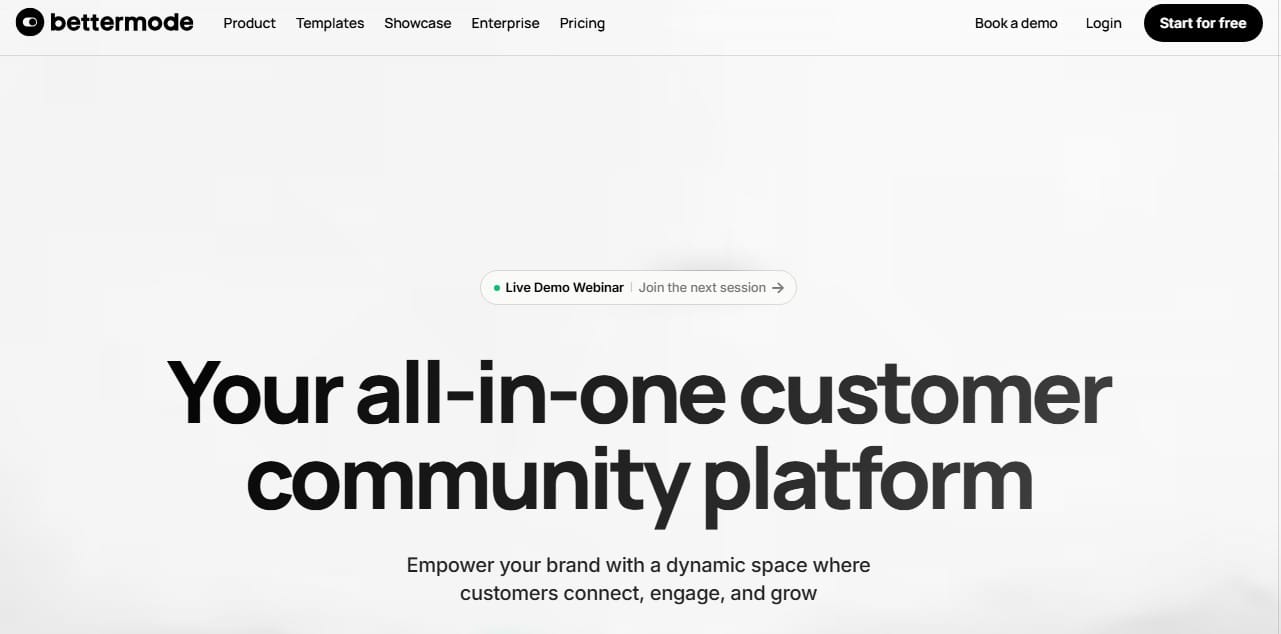
Bettermode is a highly customizable white-label community platform. It's aimed at brands and allows them to run help centers, discussion hubs, idea portals, and member spaces under their own domain.
- Pros: Highly brandable custom domain, flexible space structure with forums, Q&A, and posts, and built-in analytics.
- Cons: Advanced controls and security are gated to higher tiers. Many more serious communities will quickly outgrow the Starter plan.
- Pricing: The Starter plan is free, but it comes with a 100-member cap. The Pro plan costs $59/month when paid monthly. The Enterprise plan is priced individually.
Broadcasts and channels
These platforms are suited if your main goal is to send updates or broadcast information to a massive audience.
7. Telegram

Telegram started as a simple messaging app, and that simplicity is what makes it so popular. It’s easy for anyone to use and has two key features that set it apart: Channels and Communities. Channels are one-way broadcast tools for unlimited members, perfect for business updates. Communities (which can have up to 200K members) are for more interactive discussions.
- Pros: Set up bots, share 2GB files, create polls, and host live streams.
- Cons: Lacks advanced moderation tools, and community size is capped at 200,000 members.
- Pricing: Free to use. A premium plan for members is available for $3.99/month.
8. WhatsApp
WhatsApp has evolved from just a group chat app for friends and family into a platform for communities. Its new Channels and Communities features allow you to create a central hub for multiple groups. This works best for small communities where your audience is already using the app.
- Pros: Upload files up to 2GB, share polls, and schedule events.
- Cons: Limited permission settings, calls are capped at 32 members.
- Pricing: Free to use.
9. Zulip
Zulip combines the clean, channel-based chat of Slack with built-in livestreaming.
This allows teams to share live meetings or presentations directly in a channel. The platform is suitable for professional organizations that want all their communication (from text to live video) in one place.
- Pros: Clean interface, integrated video with livestreaming, robust integrations.
- Cons: Livestream quality isn’t as high as dedicated platforms, can be overwhelming for new users.
- Pricing: Free if self-hosted. Managed plans start around $6.67 per user per month.
Gaming
If your community is all about gaming, these alternatives offer specialized features that can beat Discord.
10. TeamSpeak
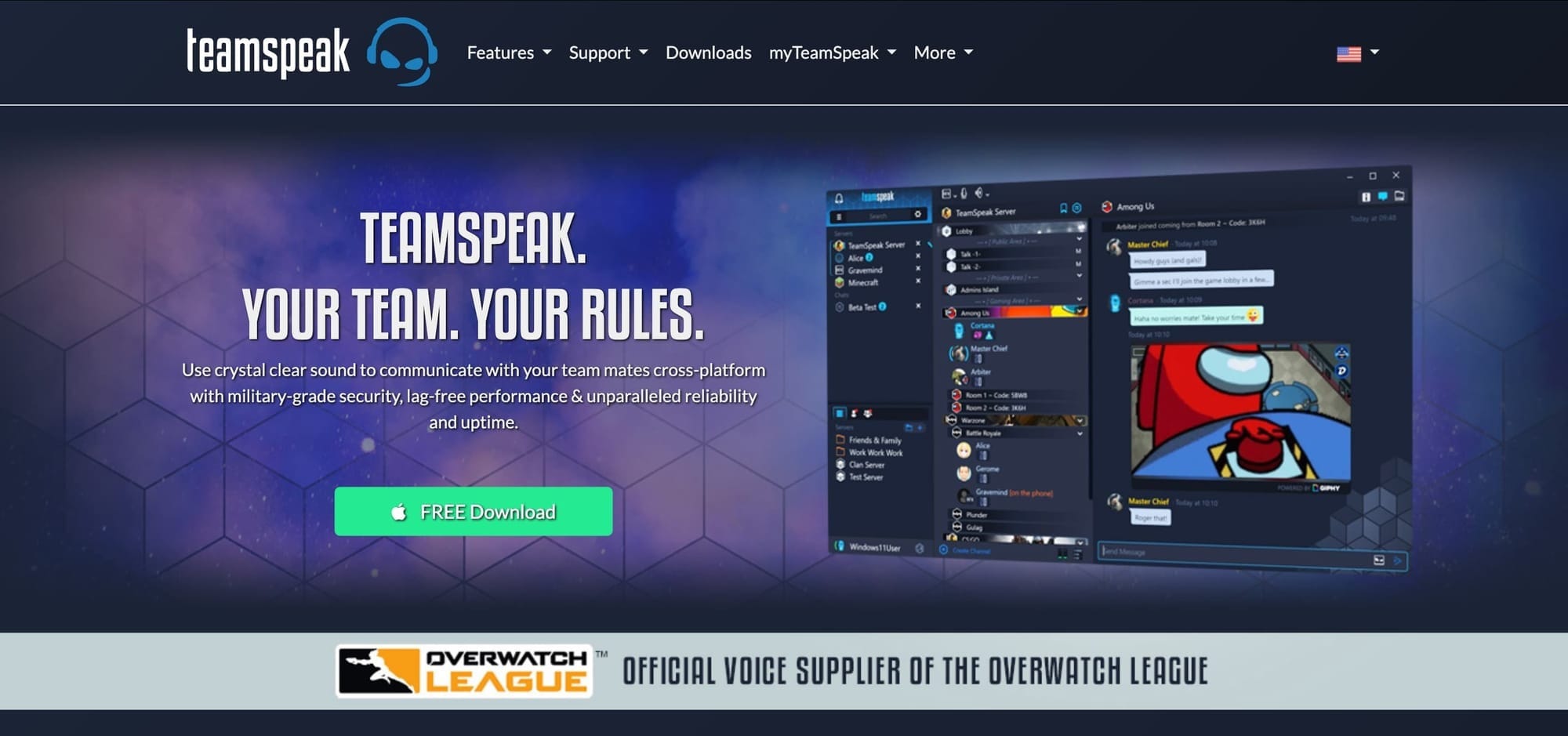
While Discord is a versatile chat app, TeamSpeak is a no-frills tool built for one thing: lag-free, high-quality voice communication. It requires you to run your own server, which is a bit of a hassle, but it's worth it for serious gamers who need a secure and reliable voice chat during gameplay.
- Pros: Top-tier voice quality, no file size limits, thousands of public servers.
- Cons: Outdated interface, no cloud-hosted solution, basic chat features.
- Pricing: A free license allows for one server with 32 active users. Other licenses require custom pricing.
11. Guilded
Guilded is essentially a souped-up Discord. It offers many of Discord’s premium features (like unlimited file uploads and high-quality voice channels) for free. It’s popular with gaming and esports communities because it includes specialized tools for event scheduling, team calendars, and tournament management.
- Pros: All core features are free, including advanced tools for gamers, optimized voice and video.
- Cons: Can be too complicated for casual users, the free model might not be permanent.
- Pricing: Completely free.
Private and secure
For communities where privacy, security, and data control are the top priorities, these platforms offer robust protection.
12. Signal
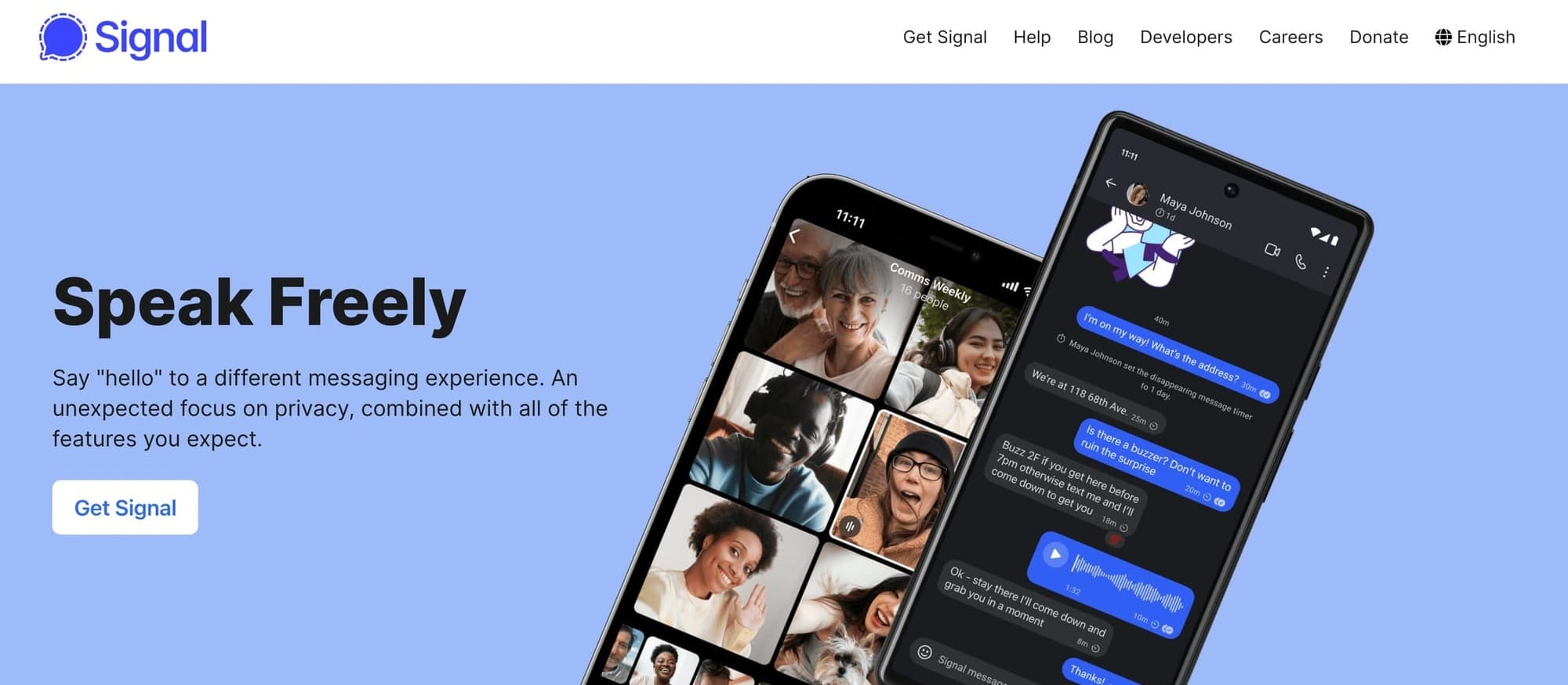
Signal’s claim to fame is its commitment to privacy. Unlike Discord, it focuses on strong encryption and doesn't collect user data. It has a simple group chat feature for connecting with friends and family, and it even allows you to share your screen.
- Pros: Strong encryption, zero data collection, screen sharing on desktop.
- Cons: Group size is capped at 1,000 members, and voice and video calls are limited to 16 participants.
- Pricing: Free to use.
13. Element
Element is a secure, open-source messaging platform built on the decentralized Matrix protocol. If you’re serious about privacy, this is a top choice. It offers end-to-end encryption and the ability to self-host your own server, giving you complete control over your data.
- Pros: Decentralized architecture, end-to-end encryption, self-hosting options.
- Cons: Challenging setup for non-technical users, utilitarian interface.
- Pricing: Free as an open-source solution, but you'll need to pay for hosting.
14. Mattermost
Mattermost is an enterprise-grade messaging platform designed for secure, self-hosted collaboration. It’s perfect for organizations with strict data privacy standards. The platform is open-source, highly customizable, and has an interface similar to Slack.
- Pros: Enterprise-level security, highly customizable, clean and user-friendly interface.
- Cons: Requires technical expertise for setup, managed solutions can be expensive.
- Pricing: Free for self-hosting. Managed cloud plans start around $10 per user per month.
Leverage existing audiences
These platforms let you tap into a built-in audience to kickstart your community.
15. Facebook Groups

Facebook Groups lets you build a community by tapping into its massive user base of over 3 billion people. It's not centered around chat channels; instead, it uses a central feed where members can post and comment. This is a good option if your target audience is already active on Facebook.
- Pros: Unlimited members, scheduled posts, and access to a huge built-in audience.
- Cons: Limited to 100 community chats, distracting with ads and notifications.
- Pricing: Free to use.
16. Reddit
Reddit communities (or subreddits) are essentially forums where discussions are organized around a topic. The platform’s upvote-downvote system pushes the best content to the top, so valuable information is always easy to find. The biggest advantage over Discord is that your subreddit is highly visible on search engines, which helps your community grow organically.
- Pros: High search engine visibility, moderation bots, and upvote-downvote system.
- Cons: In-app ads, can’t upload files directly.
- Pricing: Free to create a subreddit.
Highly technical communities
These platforms offer advanced features and customization but require decent technical know-how.
17. Discourse
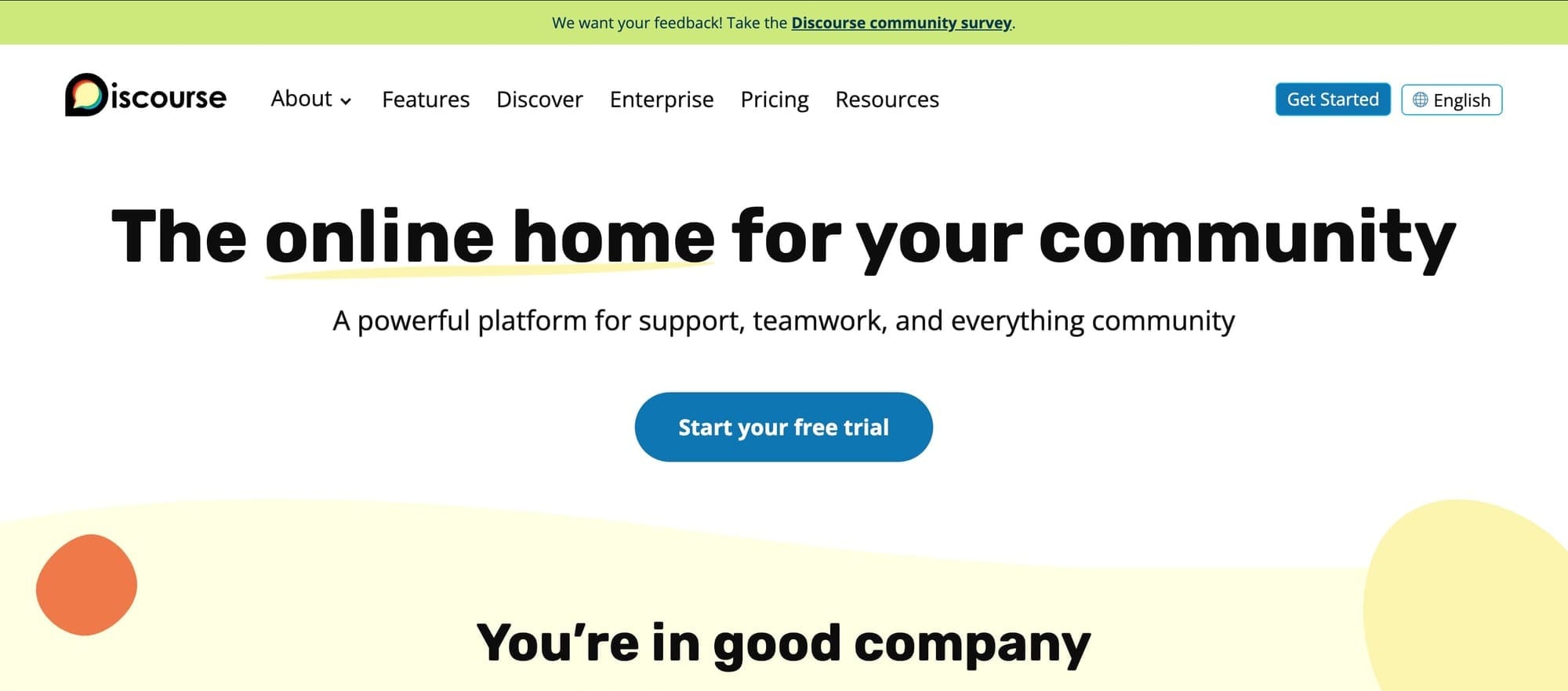
Discourse was designed to fix the messiness of old-school forums by creating a clean, organized, and SEO-friendly platform. Unlike Discord's live chat, Discourse is built for long-form, thoughtful discussions that are neatly archived in threads. This makes your content easily discoverable by search engines, helping you attract new members.
- Pros: SEO-friendly design, robust moderation tools, highly customizable, and organized threaded discussions.
- Cons: Requires technical expertise for self-hosting, lacks the immediacy of Discord.
- Pricing: Free if you self-host. Managed hosting starts at around $100 per month.
18. Rocket.Chat
Rocket.Chat is an open-source messaging platform for teams with unique security or integration needs. It offers total control, giving you the flexibility to choose between self-hosted or cloud-hosted options. While the setup can be complex, its extensive API support lets you tailor the platform to your exact specifications.
- Pros: Fully customizable and open-source, flexible hosting options, extensive API support.
- Cons: Too complex for non-technical users, utilitarian interface might reduce engagement.
- Pricing: Free to use, but you'll still need to pay for a hosting plan. Cloud-hosted solutions start at $3 per user per month.
Education
19. Mighty Networks
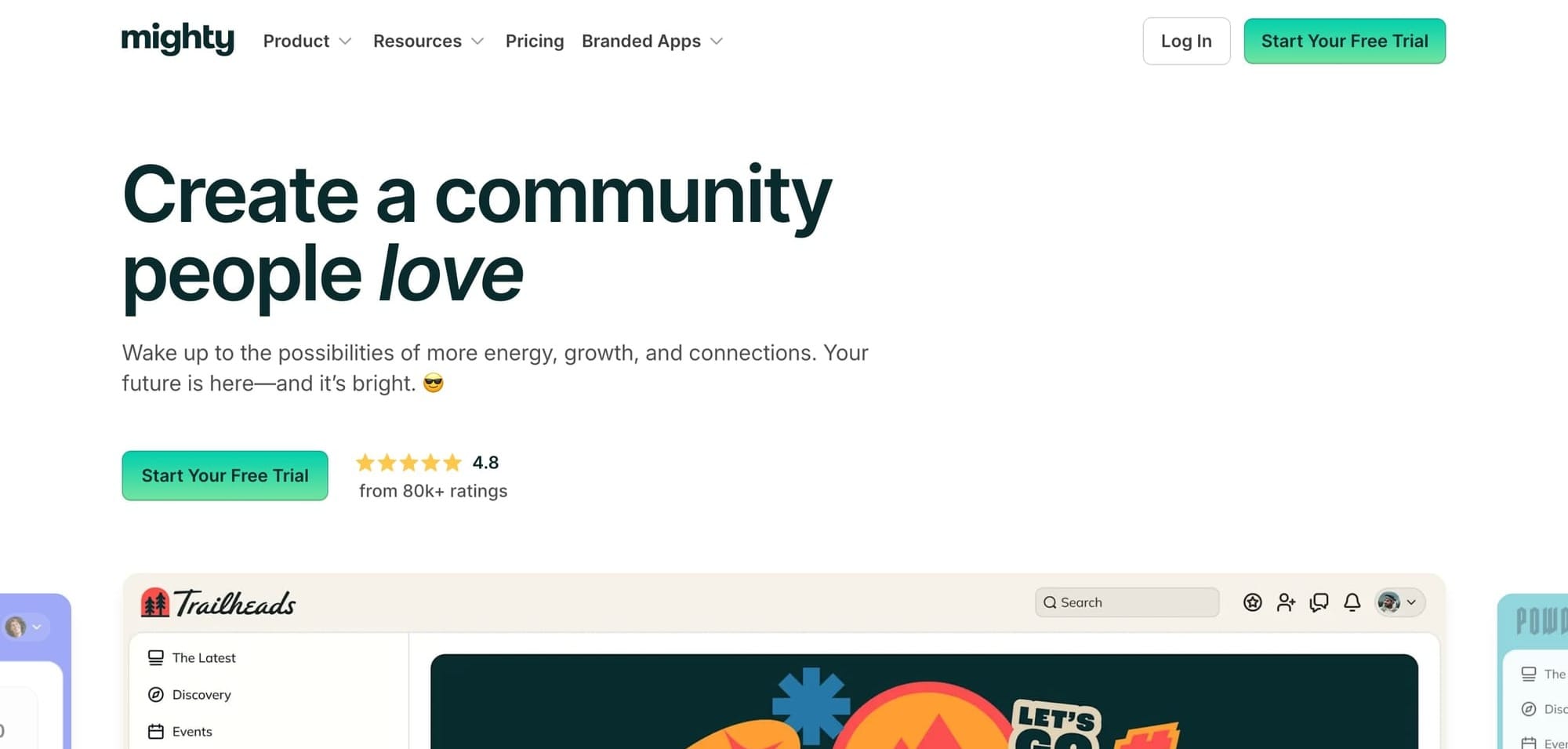
Mighty Networks is a robust community platform that goes beyond simple chat. You can use it to share courses, host live events, and organize content. A standout feature is its powerful analytics, which gives you key insights into member activity and engagement.
- Pros: Organize Spaces into collections, connect to a custom domain, and charge a one-time or recurring fee.
- Cons: The starter plan doesn't have analytics, supports only Stripe for monetization, and has limited native integrations.
- Pricing: There's no free plan, only a 14-day free trial. Plans start at $49/month (plus 3% transaction fees), and can run as high as $360/month (plus 1% transaction fees).
20. Skool
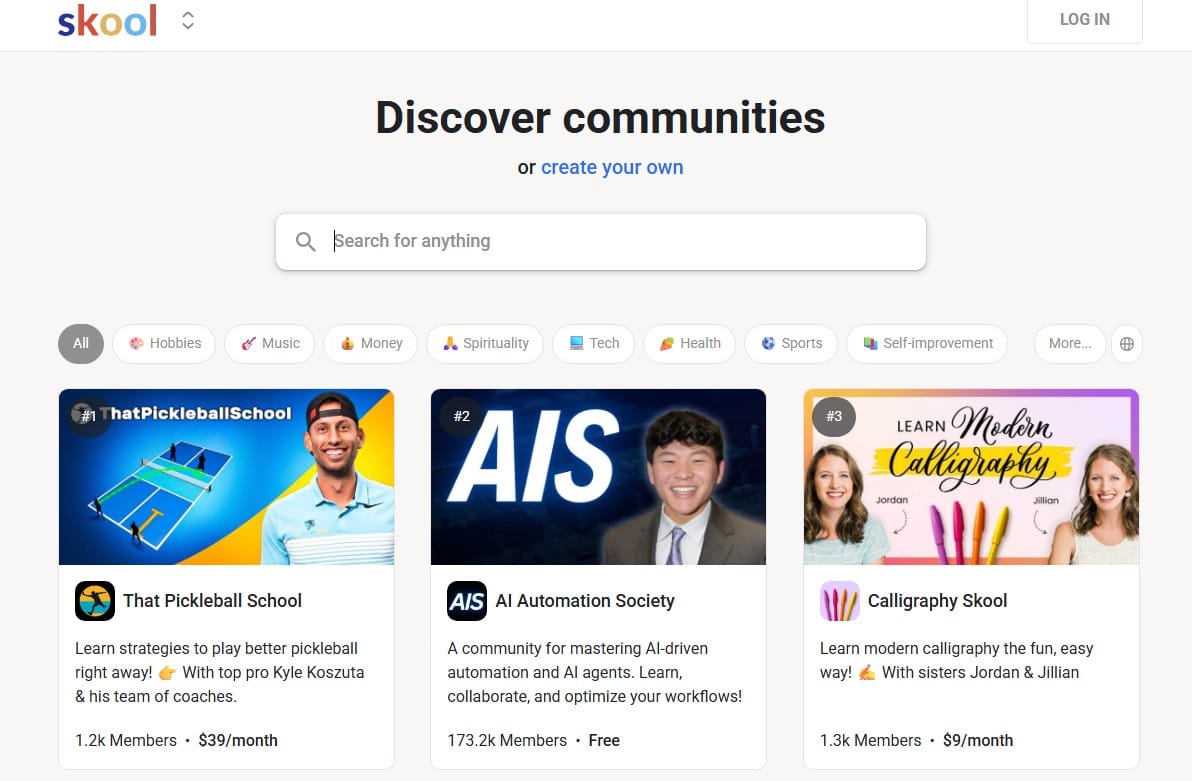
Skool is a community platform centered around learning – as the name itself implies. It helps you set up a virtual classroom and involves some gamification to make learning more fun.
- Pros: Clean, simple user experience; built-in gamification with points and levels; ability to go live on video.
- Cons: Huge gap between subscription pricing tiers, and high transaction fees on the cheaper plan.
- Pricing: Skool offers two plans: $9/month for the Hobby plan and $99/month for the Pro plan. The Hobby plan comes with a 10% transaction fee, while the Pro plan scales back to a 2.9% fee.
Worthwhile mentions
These last few platforms can also grow and manage communities in a way similar to Discord, but may lack important features.
21. Swarm
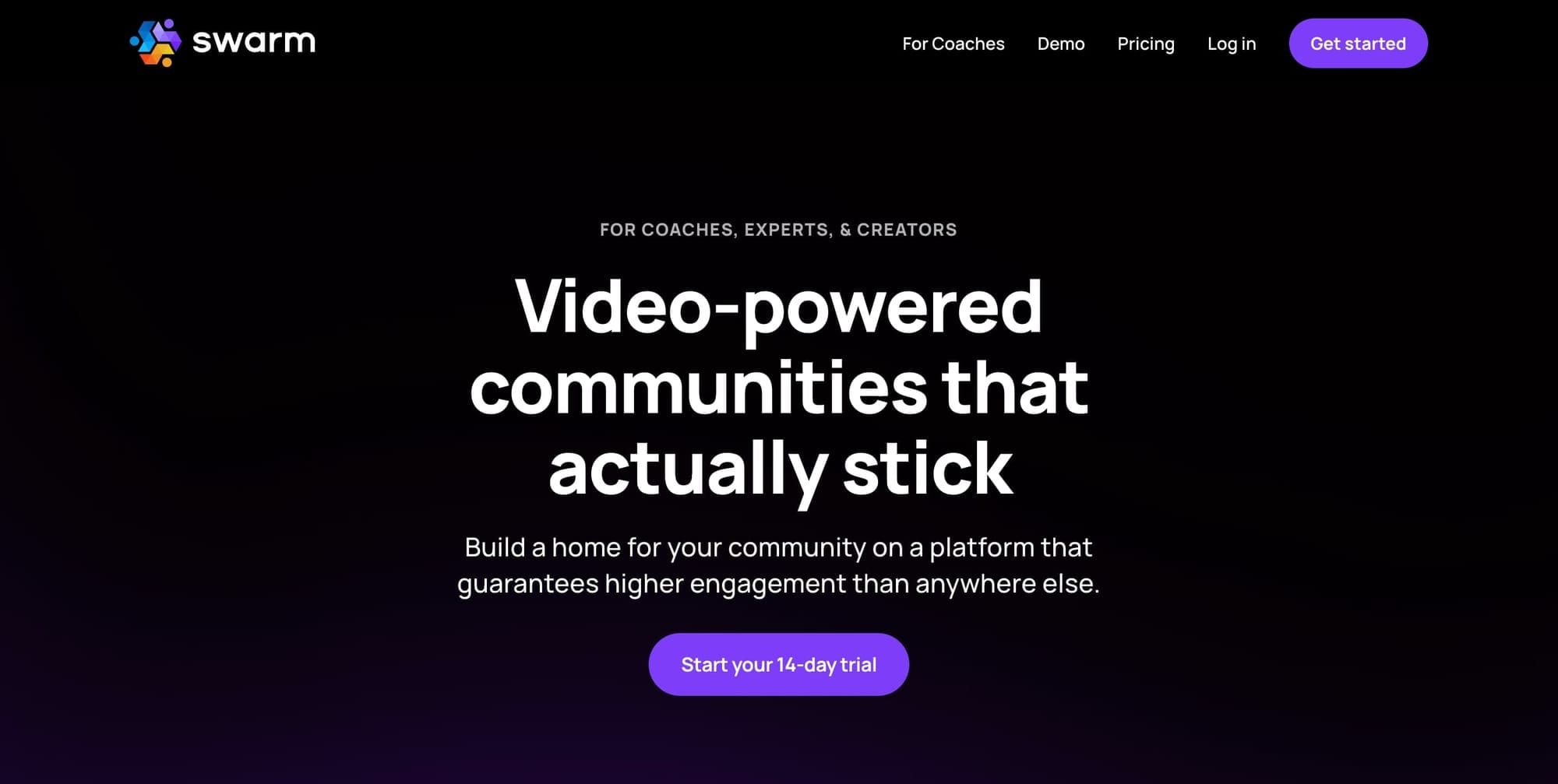
Swarm is a professional-looking platform with a heavy focus on video. Unlike Discord, it encourages users to share short video clips in channels and DMs, making it perfect for maintaining personal, face-to-face interactions without constant live calls. It also includes auto-generated captions and a transcription tool.
- Pros: Host live streams and share recordings, auto-generated captions, and a professional interface.
- Cons: Limited native integrations, paid plans are required for larger communities or longer live streams.
- Pricing: Swarm has a 14-day free trial. The Novice plan starts at $49/month, while the Elite plan is $399/month.
22. Gather
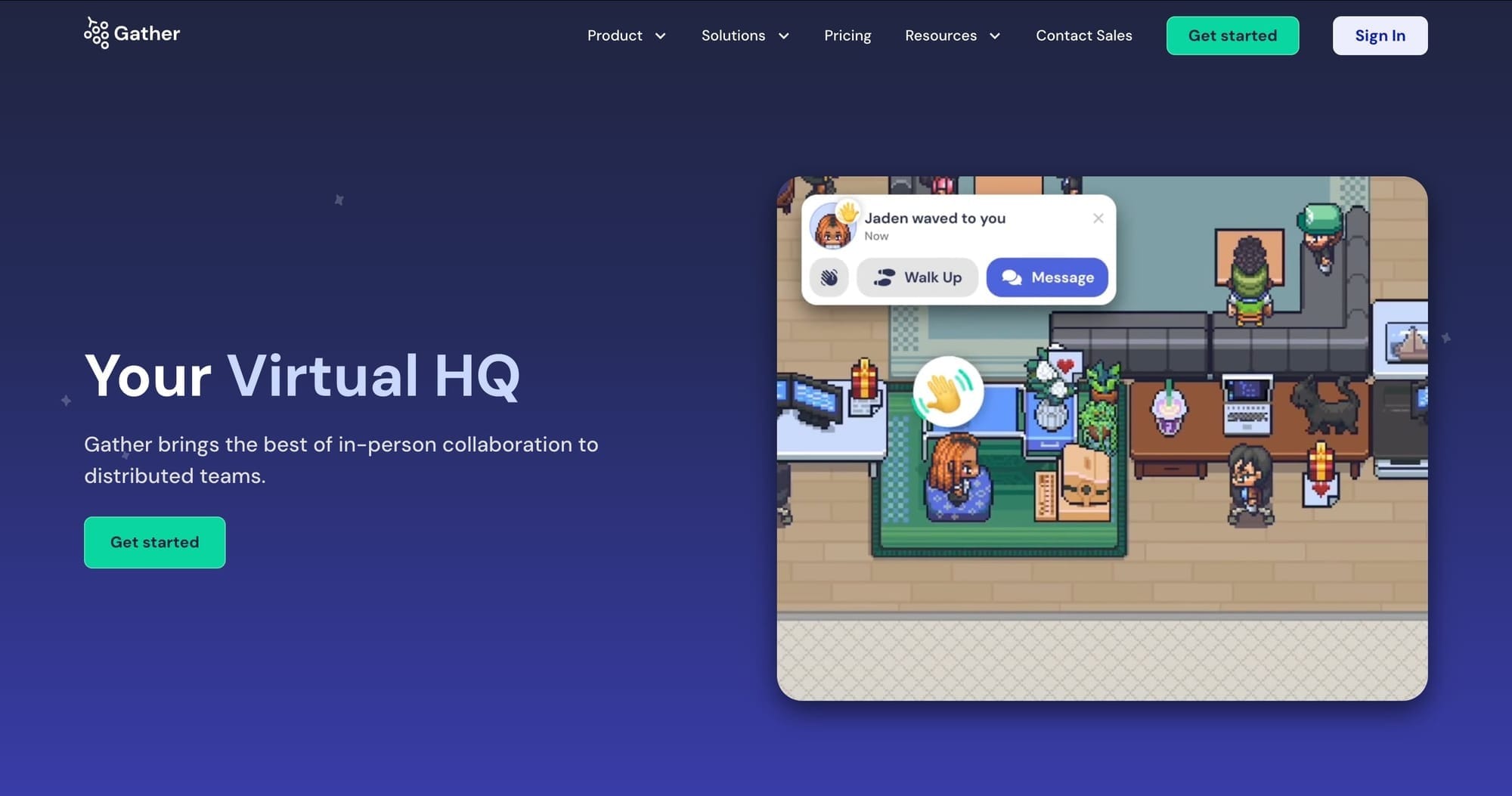
Gather creates an interactive, game-like environment for remote teams and communities. Users navigate a virtual office with custom avatars, and clever features like proximity-based audio and video make conversations feel natural. It's a great way to replicate the feel of a physical office or event.
- Pros: Immersive, spatial environment, proximity-based audio and video, highly customizable spaces.
- Cons: The game-like interface may feel unprofessional, not designed for 24/7 drop-in communities.
- Pricing: Gather has a free plan for small-scale meetings. Paid plans for larger events start at around $8 per user per month.
Why should I choose a Discord alternative?
Because Discord wasn’t built for growth or monetization.
"Platforms like Whop are really great because it takes your existing skills and lets you monetize those skills. It's definitely the next logical step."
— Volky, Digital Nomad Community
It’s great for chatting — but if you’re running a business, membership, or professional community, its limits will hold you back fast. From file restrictions to missing integrations and zero built-in monetization, Discord makes it hard to scale.
Here’s why more creators are switching to better platforms:
1. The learning curve is no joke
For a casual user, Discord's features can be overwhelming. Setting up complex roles, permissions, and bots requires a lot of time and technical know-how. If you’re not a tech expert, you’ll find it’s not as simple as just starting a server.
2. File uploads are a pain
Sharing anything larger than a meme is a hassle: Discord's free plan limits file uploads to a tiny 10MB.
To get a higher limit, you have to pay for Nitro Basic ($2.99/month for 50MB) or Nitro ($9.99/month for 500MB), which is still very restrictive for sharing videos, design files, or other big assets.
3. Discoverability is low
Discord is huge, and sticking out in a sea of communities is pretty tough.
Reddit user SamHatchBMA said:
Discord comes at the cost of discoverability being pretty poor, so you would have to already have an established presence and would need to direct members to join the server from an existing platform.
4. Discord has only a few native integrations
Discord has a limited number of native integrations, and most are gaming-related. If your community is a business, you'll struggle to connect with essential apps for project management, payments, and marketing, which severely limits collaboration and growth.
On the Whop App Store, choose from over 100 integrations to plug and play, customizing your community and increasing revenue.
5. Privacy concerns
Sure, Discord is generally safe, but it lacks end-to-end encryption. For privacy-conscious communities, this can be a big issue, especially if you're sharing sensitive or confidential information.
6. No built-in monetization
And the biggest one – Discord was not built for business. There is no easy, built-in way to sell access to your community or charge for exclusive content.
To make it work, you have to rely on complicated, clunky workarounds that create a bad user experience and can cause you to lose members.
What is the best Discord alternative?
If you want to grow and monetize your community, Whop is the best Discord alternative — hands down.
It’s the only platform that lets you host, sell, and manage everything in one place — from memberships and courses to exclusive chats and digital offers. You get built-in payments, integrations, and growth tools without relying on clunky add-ons or bots.
That said, the “best” platform depends on your goals. Ask yourself:
- What do I want to achieve with my community?
- Do I plan to monetize now or later?
- Do I want to sell other offers alongside it?
- Do I need one platform for everything, or multiple tools?
If you want the simplest, most scalable setup for building and monetizing a community — Whop is the clear choice.
Whop: the best platform for your online community
Discord is a great chat platform, but its features can be a headache for anyone trying to build and monetize a business.
If you’re a creator, small business owner, or digital entrepreneur who needs a streamlined, all-in-one platform to grow your online community, Whop offers the ultimate solution.
Get started for free; we make no money until you do. Even better, you get to keep up to 97% of your earnings.
Creators, small business owners, and digital entrepreneurs – sign up to Whop and start monetizing your online community with ease.

